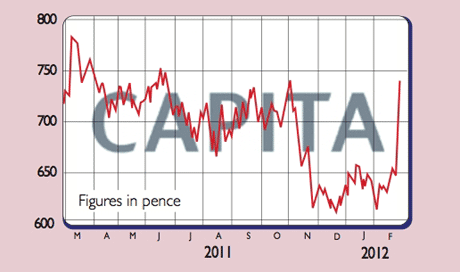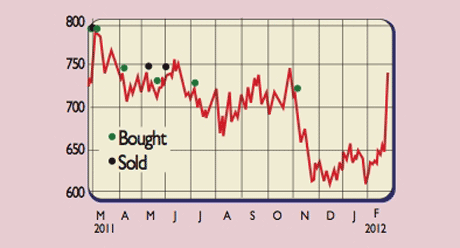Shares in focus: Can Capita continue to grow?
Capita is a robust business. But with the public sector cutting back on costs, can the outsourcer continue its growth? Phil Oakley investigates.
Get the latest financial news, insights and expert analysis from our award-winning MoneyWeek team, to help you understand what really matters when it comes to your finances.
You are now subscribed
Your newsletter sign-up was successful
Want to add more newsletters?

Twice daily
MoneyWeek
Get the latest financial news, insights and expert analysis from our award-winning MoneyWeek team, to help you understand what really matters when it comes to your finances.

Four times a week
Look After My Bills
Sign up to our free money-saving newsletter, filled with the latest news and expert advice to help you find the best tips and deals for managing your bills. Start saving today!
The business
Capita specialises in business process outsourcing. Essentially, other companies and governments pay Capita to do their administrative, back-office-type jobs more cheaply and more efficiently than they can do them in-house. These sorts of activities include call centres, human resources, payroll, insurance claims, pension and insurance policies, shareholder services and IT management.
Capita has several high-profile outsourcing contracts, such as dealing with TV licensing, collecting road tax for the Driver and Vehicle Licensing Agency and managing the Criminal Records Bureau. Its operations are managed through 64 business centres in Britain, India and Europe and 48% of its revenues come from the British public sector.
The history
Rod Aldridge founded the firm in 1984. Initially part of the Chartered Institute of Public Finance and Accountancy (CIPFA), the business started by providing computer services to local councils. In 1987, backed by venture capitalists 3i, Aldridge bought the business from CIPFA for £330,000. It was renamed Capita.
MoneyWeek
Subscribe to MoneyWeek today and get your first six magazine issues absolutely FREE

Sign up to Money Morning
Don't miss the latest investment and personal finances news, market analysis, plus money-saving tips with our free twice-daily newsletter
Don't miss the latest investment and personal finances news, market analysis, plus money-saving tips with our free twice-daily newsletter
In the 1990s, the company grew rapidly by winning contracts from local and central government. Capita also diversified into other business areas, such as insurance, by buying other outsourcing firms. As the business built scale, profits soared. Capita became a big favourite with investors: the shares quadrupled in price between 2002 and 2007. In recent years, growth has slowed for two main reasons. The weak British economy means many of its customers are spending less, and the sector has become more competitive.
The chief executive
Paul Pindar has been CEO since 1999. After training as an accountant, he went to work for 3i, and helped to advise Capita on its management buyout from CIPFA in 1987. Shortly afterwards, then-Capita boss Aldridge asked him to join the firm.
Even after taking the top job, Mr Pindar remained somewhat overshadowed by the charismatic Aldridge, who held the role of executive chairman. However, in 2006, Aldridge left the company under a cloud after lending £1m to the Labour party a revelation that temporarily tarnished the company's reputation.
A keen Leeds United fan, Pindar's performance as CEO has comfortably exceeded his favourite team's antics on the football field during the last decade. His basic salary is £380,000.
Are the shares a good investment?
Capita has many hallmarks of a good company. It has high profit margins and returns on capital of more than 20%. But can it keep growing? Underlying sales fell by 7% in 2011 as many of its customers cut spending. Some customers have also changed their payment terms, which has reduced Capita's cash generation.
The company has also spent just under £700m on buying companies during the last two years to boost growth. On a more positive note, Capita is bidding on £4.7bn-worth of new contracts and should return to sales growth in 2012.
But just how much growth is there in outsourcing? Industry analysts IDC estimate a potential British market of £117bn, compared to just £8.1bn in 2011. Pindar talks of the huge potential cost savings available if the government outsourced more back-office functions.
But there remains huge insider opposition to outsourcing in central and local government. Some councils have even begun returning some services in-house. There is also the issue of contract prices. Will Capita be able to win and retain business at the same profit margins?
Given these concerns, while Capita is no longer highly rated by the stockmarket, its shares are not cheap either. Capita remains a solid business, but given the uncertainty over the outlook, it's not a buy at this price. Hold.
The numbers

Stockmarket code: CPI
Share price: 747p
Market cap: £4.6bn
Net assets (Dec 2011): £524m
Net debt (Dec 2011): £1.3bn
P/e (current year estimate): 14.2 times
Yield (prospective): 3.2%
What the analysts say
Buy 11
Hold 8
Sell 6
Average price target 750p
Director Shareholding

P Pindar: 1,701,903
G Hurst: 54,943
M Bolland: 55,000
M Bell: 81,094
Get the latest financial news, insights and expert analysis from our award-winning MoneyWeek team, to help you understand what really matters when it comes to your finances.
Phil spent 13 years as an investment analyst for both stockbroking and fund management companies.
-
 Early signs of the AI apocalypse?
Early signs of the AI apocalypse?Uncertainty is rife as investors question what the impact of AI will be.
-
 Reach for the stars to boost Britain's space industry
Reach for the stars to boost Britain's space industryopinion We can’t afford to neglect Britain's space industry. Unfortunately, the government is taking completely the wrong approach, says Matthew Lynn